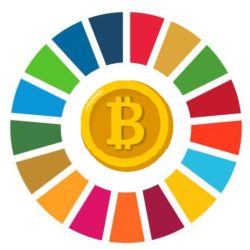
Why the SDGs Need Blockchain

Blockchain may prove to be one of our greatest discoveries, a technology that radically improves almost every aspect of our lives.
It also has an important role in what should be an issue at the forefront of everyone’s minds: reaching the Sustainable Development Goals (SDGs).
This may surprise you if you only knew of blockchain through its connection to bitcoin, but the technology has so many uses that are set to revolutionize so many aspects of our lives.
One of the major ways blockchain will be used to achieve the SDGs is in the process of digitizing finance.
Of course given the importance of this upgrade it’s not something that can just be left to develop naturally. This is the purpose of the Task Force on Digital Financing of the SDGs. Created by the UN Secretary General, the task force aims to determine how to best use digital finance and FinTech to achieve the SDGs.
Its interim report lays out the ways FinTech can help democratize the financial world and return the power to the people as well as the risks involved in digitizing the SDGs.
Blockchain is set to play a pivotal role in bringing finance to the underserved as well as improving financial services for everyone else and it is imperative to the successful completion of several SDG goals. I know the task force’s findings will recognize the importance of blockchain and FinTech in creating a sustainable world and will lay out a clear path for us to follow to best reap the benefits of the FinTech revolution.
Another key SDG area that is going to heavily rely on blockchain? ID. Target 16.9 of the goals is to provide legal identity for all. Considering that over one billion people currently don’t have access to a solid form of ID this is a major task.
Blockchain technology is likely the only way it is even feasible.
ID2020 is an alliance looking to harness the power of blockchain to provide ID to all those currently living without. It provides funding to innovators using blockchain to improve digital identity, in turn helping people lacking ID who can’t access services like healthcare or government subsidies.
This is an incredibly important cause, as climate emergencies are creating more and more refugee crises and lack of identification is proving to be a major hurdle.
BanQu is another company seeking to help the unnamed people of the world, giving them a chance to leave an imprint through the creation of (what it calls) an Economic Identity.
Project Zero Invisible Children (ZINC) is definitely an initiative the world should get behind. It uses the blockchain and mobile applications to register all those people who, due to the effects of climate change or war, lack formal proof of identification.
Living in a first-world society we may not be able to fully grasp how important a cause this is, but these companies really are making an amazing and positive impact to billions of people across the globe.
As climate change continues to affect the planet and more and more climate refugees or immigrants are created new issues come into play when it comes to properly resettling them.
In order to survive and thrive in their new homeland, these new residents need the opportunity to become productive members of society, and this means entering the workforce.
Enter the work visa. Not a new concept, its base form is time-consuming and fraught with complications. When done by mail, i.e. the old way, it carries a real risk of taking too long or resulting in a lost application. Online applications are another option, but require a level of knowledge not everyone will have.
This is why the next big step in the blockchain movement will likely be work permits—or more specifically, companies helping with the work permit process.
PassRight serves as a good example of how this system can and does work. Its platform helps guide (potential) employees through the work visa procedure. Currently being used to manage O-1 applications the PassRight platform makes it much easier to go through the long and stressful process of applying for a work visa.
This is good to see, as we want our new residents to be able to work legally and no one should want to make the process harder than it should be.
Blockchain technology is a real game changer and its potential is astounding. It should be a no-brainer to explore how it can be used in our quest to reach the SDGs and better the planet for everyone.
Digital finance, ID and work visas are three areas that can heavily impact our ability to function in today’s world. It’s great to know that innovators have seen the potential in blockchain and are working with the technology to find the solutions we need to make our future bright.

